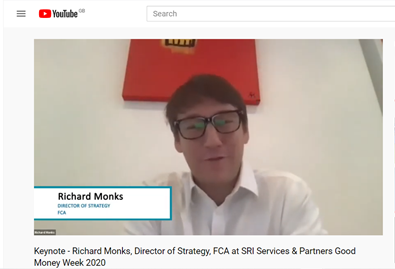Building Trust in Sustainable Investment – FCA keynote speech at SRI Services Good Money Week event
Posted on: November 26th, 2020

On 21 October 2020 Richard Monks – Director of Strategy at the FCA – kindly gave the keynote speech at our annual ‘SRI Services and Partners Good Money Week event’.
There is a transcript of his speech available on the FCA website here.
We were delighted with the content of the speech and welcome the fact the FCA is balancing the urgency of the challenges we face with a recogniton of the very real challenges the sustainable investment community faces as our activity widens, deepens and expands.
Some of my favourite high level ‘take aways’ are:
- The FCA recognises the growing importance of sustainable finance and ESG investment strategies. They know the area is here to stay, that clients care about it – and that clients’ trust in the area matters.
- Their aim is to strike a balance between protecting end investors from misselling and greenwash and not stifling growth and innovation. As such their current focus is on areas like improving information flow, linking this agenda to core regulatory principles such as ensuring products are ‘true, fair and not misleading’.
- They are actively engaged in shaping the sustainable finance agenda with government, other UK regulatory entities and internationally.
- They understand the challenges around data imperfections, recognise that conflicting data is not necessarily ‘inherently undesirable’- but have concerns about where data is used ‘mechanistically’ , without proper consideration and/or not properly explained to clients.
- They understand that ESG & sustainable funds can have diverse strategies (including investing in companies that are ‘transitioning’ to greener practices) but are concerned that fund names and strategies are not always aligned – and may mislead clients if not explained properly. They want investment products to meet clients’ reasonable expectations.
- They are concerned about (and considering) the challenges relating to the measurement of ‘real world impacts’ – ‘impact measurement’ – also referred to as ‘non-financial performance reporting’.
- The FCA is keen to address challenges by encouraging and facilitating the flow of useful data by focusings initially on corporate reporting. They are currently consulting on this area – key areas being working are embedding TCFD more widely and their co-chairing an IOSCO sustainability workstream with the aim of developing common international standards.
- The FCA expects that some of the EU’s Sustainable Finance Action Plan will be adopted after the Brexit transition period, and welcomes the government’s aim to ‘match the ambition of [its] objectives’ (as part of the UK’s Green Finance Action Plan). [nb What was not said was that the adviser related MIFiD ii requirements, that were expected in March 2021, will necessarily be implemented as expected – although we would be likely to aim for the same ‘outcomes’. See Q&A section at around 22 minutes on the video below for more on this].
- The FCA is gathering consumer research on this area.
- The FCA is considering setting out ‘guiding principles’ for ESG / sustainability product design and disclosure (see bullet points below).
Transcript link – to FCA website here. We recommend you read Richard’s speech in full!
The video of the full presentation is available on our YouTube channel and below.
The following text covers ‘product design and disclosure’ guideline that the FCA is considering. This is ‘cut and paste’ from the speech as shown on the FCA website. We have published this for ease of reference. Please see full speech before considering these further:
…Building some guiding principles
“Building on this, we are considering whether it would be helpful to articulate a set of guiding principles to help firms with ESG product design and disclosure. This could help to tackle the concerns I’ve already outlined and ensure that consumers are protected from potential greenwashing. We have 5 areas for potential principles in mind.
- Consistency in messaging and approach. A product’s ESG focus should be clearly stated in its name. And then reflected consistently in its objectives, its investment strategy, and its holdings. This is all about ensuring that a product really does do what it says on the tin and matches consumers’ expectations.
- A product’s ESG focus should be clearly and fairly reflected in its objectives. Where a product claims to target certain sustainability characteristics, or a real-world sustainability impact, its objectives should set these out in a clear and measurable way.
- A product’s documented investment strategy should set out clearly how its sustainability objectives will be met. This should include describing clearly any constraints on the investible universe. This includes any screening criteria and anticipated portfolio holdings. This should also include the fund’s stewardship approach and actions the fund manager will take if investee companies are failing to make the desired progress.
- The firm should report on an ongoing basis its performance against its sustainability objectives. This is about giving consumers the information they need to understand whether the stated objectives have been achieved in a quantifiable and measurable way.
- The firm should assure ESG data quality, understand their source and derivation, and articulate clearly and accessibly how it is used. This includes the use of ESG ratings in the investment process.”
Other videos from this event can be viewed here.